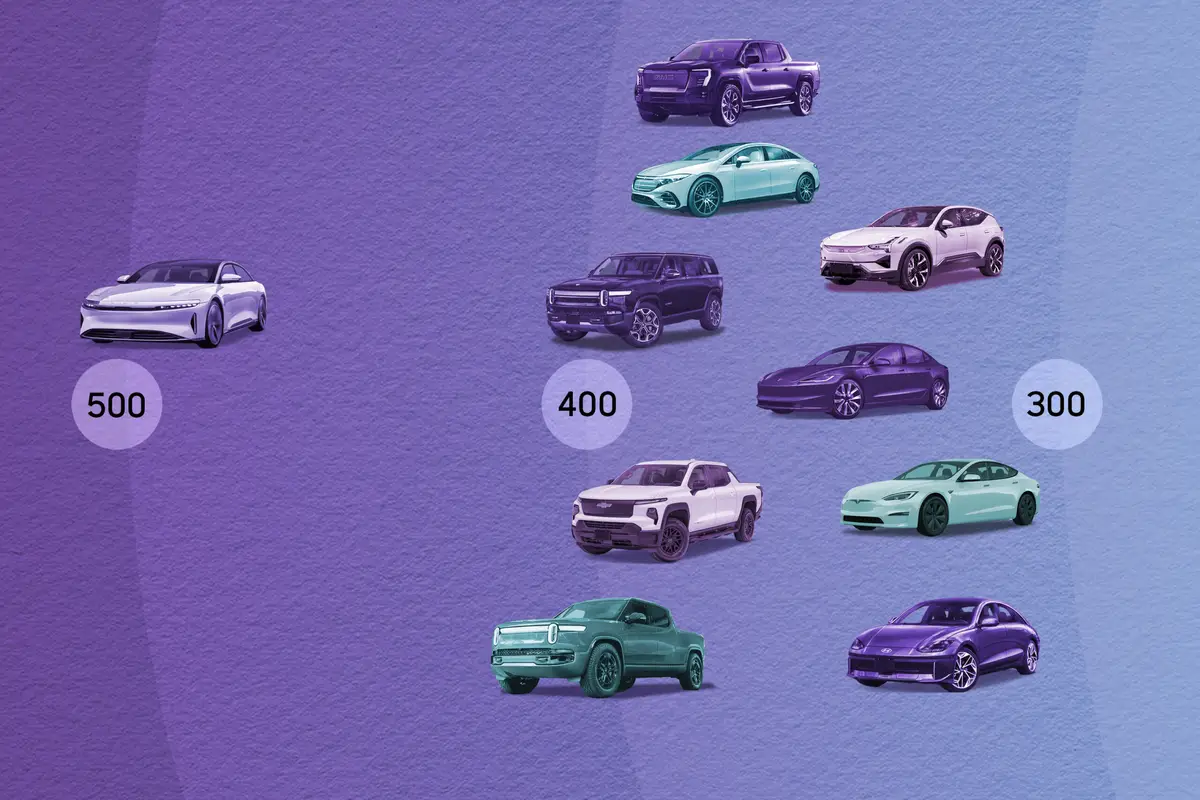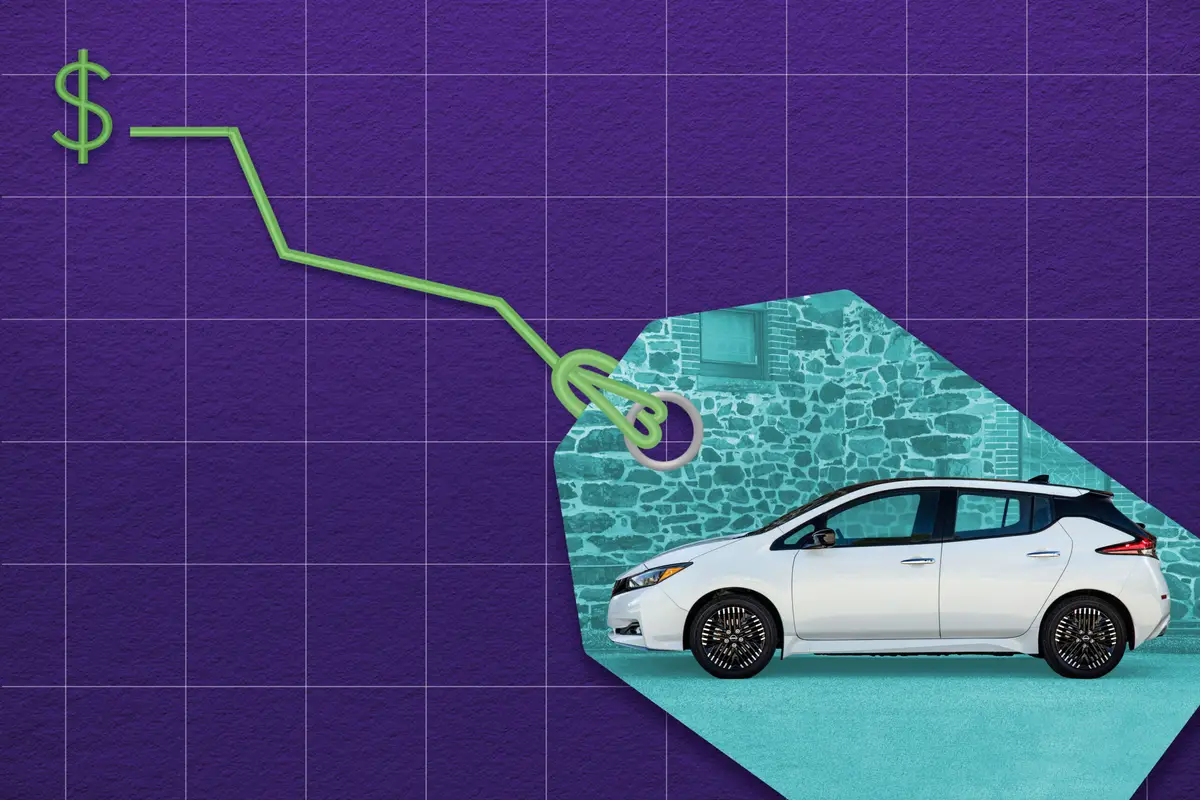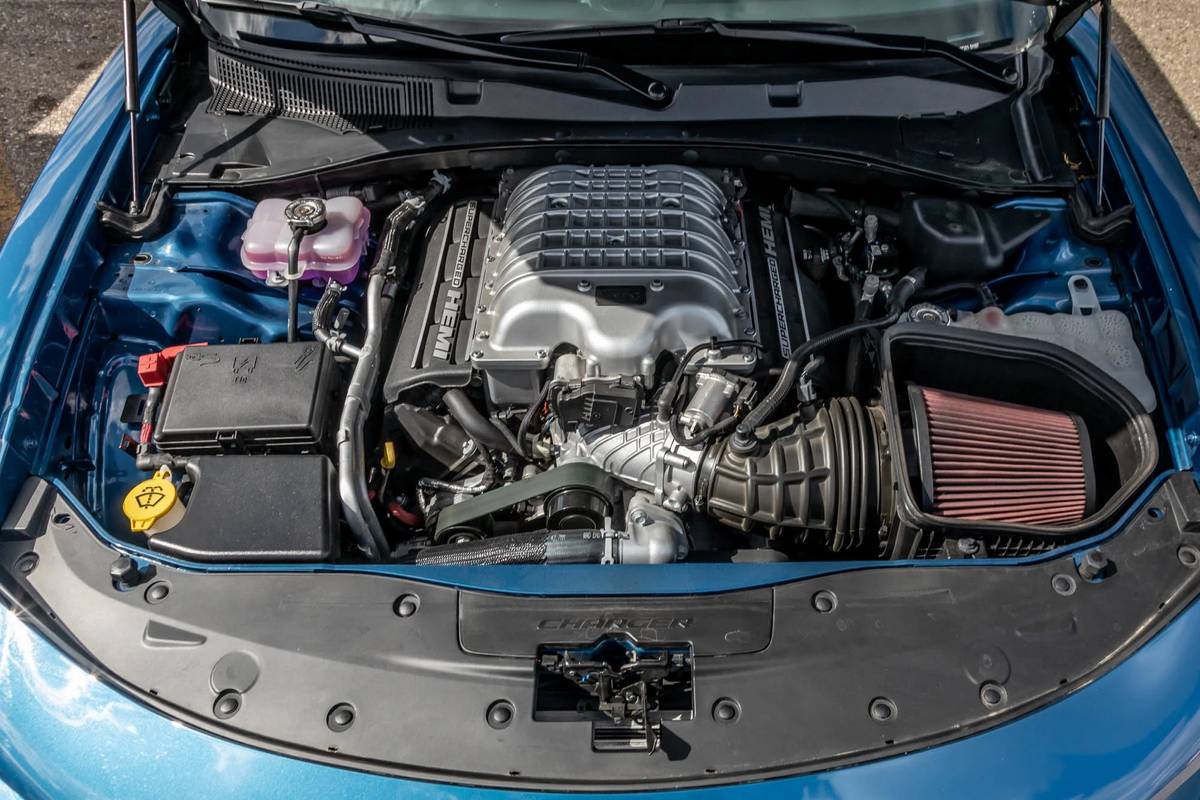2024 Lexus LS 500h Review: Refreshingly Uncomplicated

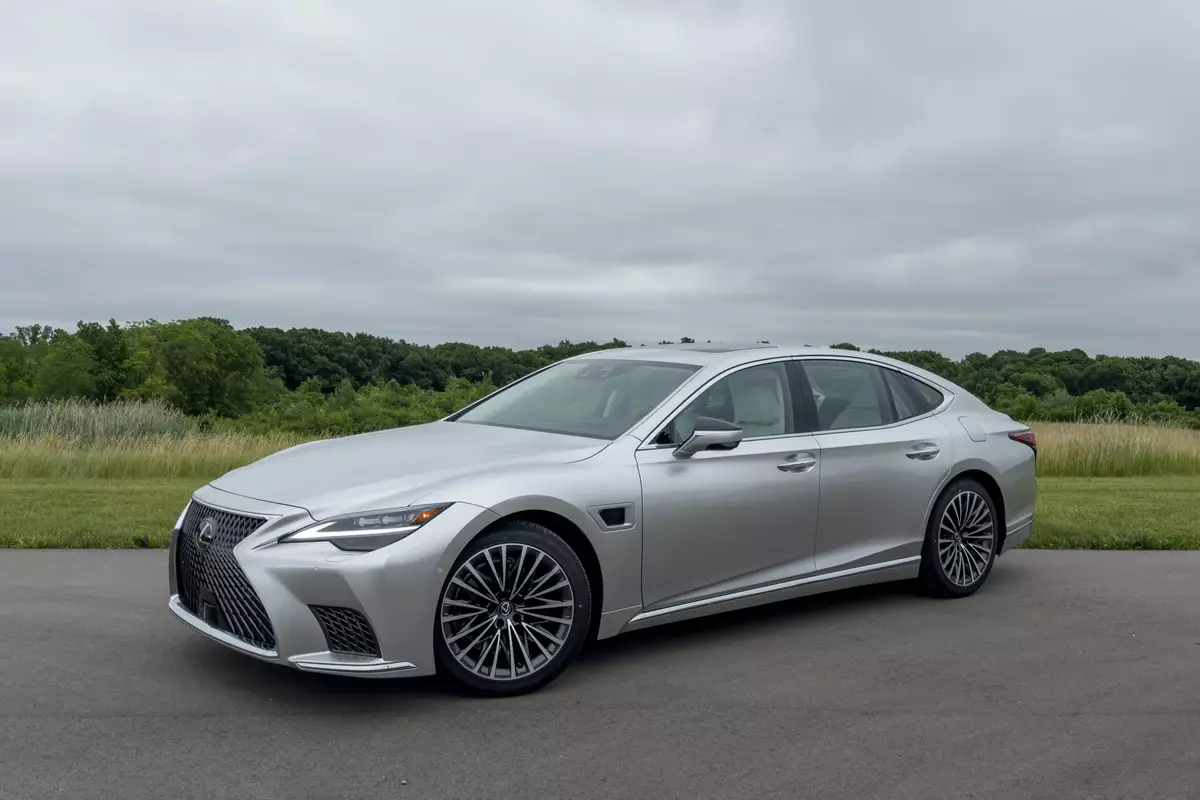
The verdict: An old-school luxury sedan that struggles with modern-day life, the 2024 Lexus LS 500h is a comfy but dated throwback to an earlier time.
Versus the competition: It’s not as spacious, not as sophisticated and not as modern or stylish as its German and Korean competitors, but Lexus’ uncomplicated approach just might be what its loyal customers are looking for.
Full-size luxury sedans are getting complicated. Look at the new Mercedes-Benz models: The E-Class and S-Class have glass cockpits and multimedia systems so crazy you need astronaut training to adjust the temperature. The latest BMW 7 Series isn’t any better, and I often wonder how older buyers — who are precisely the target market for expensive, traditional luxury sedans — are supposed to be able to use these tech-laden new cars when I, an experienced automotive journalist, often have trouble figuring them out.
Bucking this trend, the Lexus LS 500h does not suffer from overcomplication. That’s partly by design — it features a lot of dedicated buttons and knobs instead of touch-based controls — and partly due to circumstances. Lexus’ flagship luxury sedan hasn’t seen a redesign in years, debuting in its current guise for the 2018 model year and getting a mild interior refresh for 2021. But can its throwback charm stand up to the new wave of competitors’ glass-cockpit luxury flagships? We drove a hybrid-powered LS 500h for a week to find out.
Related: Haku, Kiriko and Teammate: 2024 Lexus LS Priced From $80,685
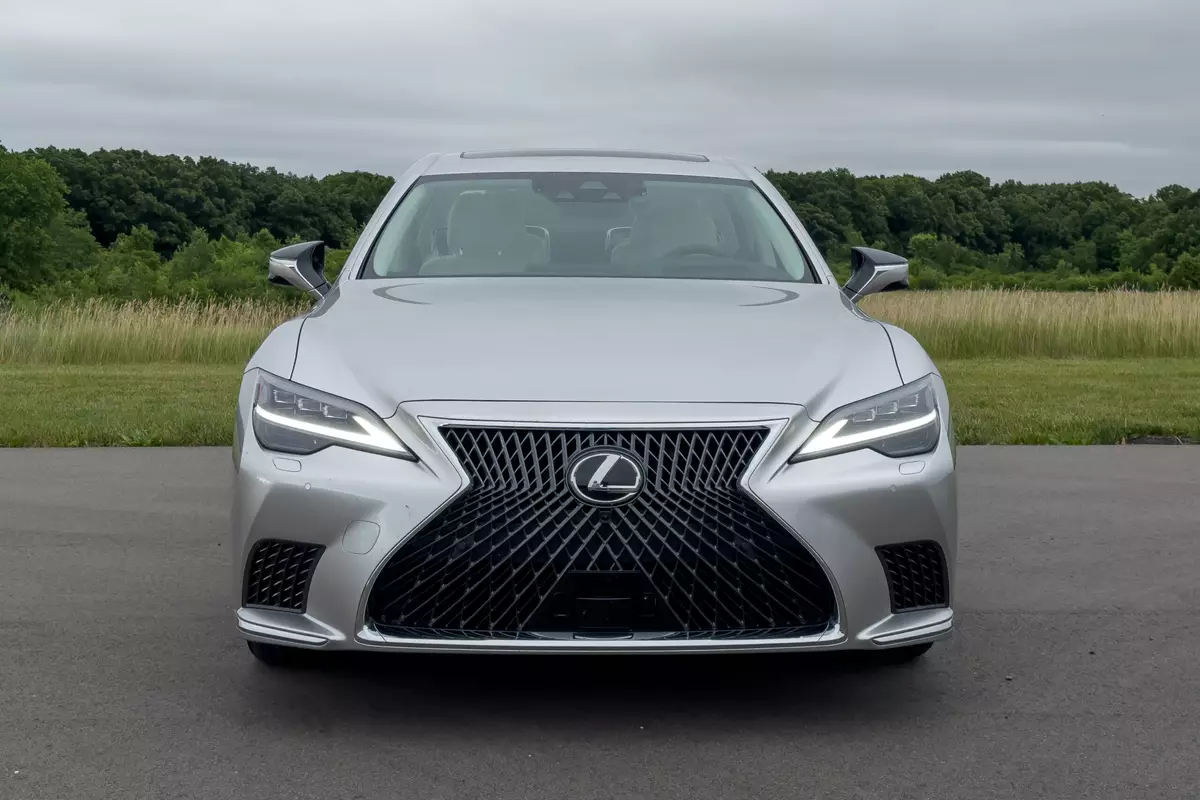
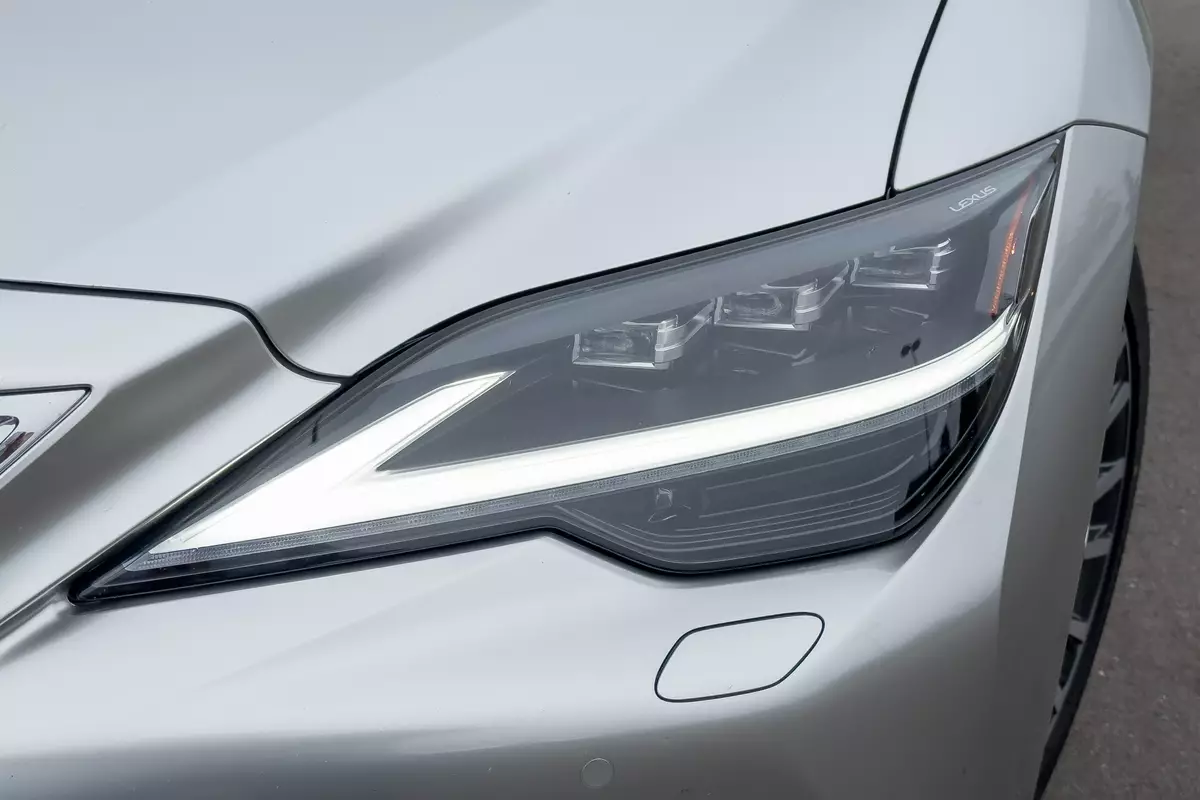

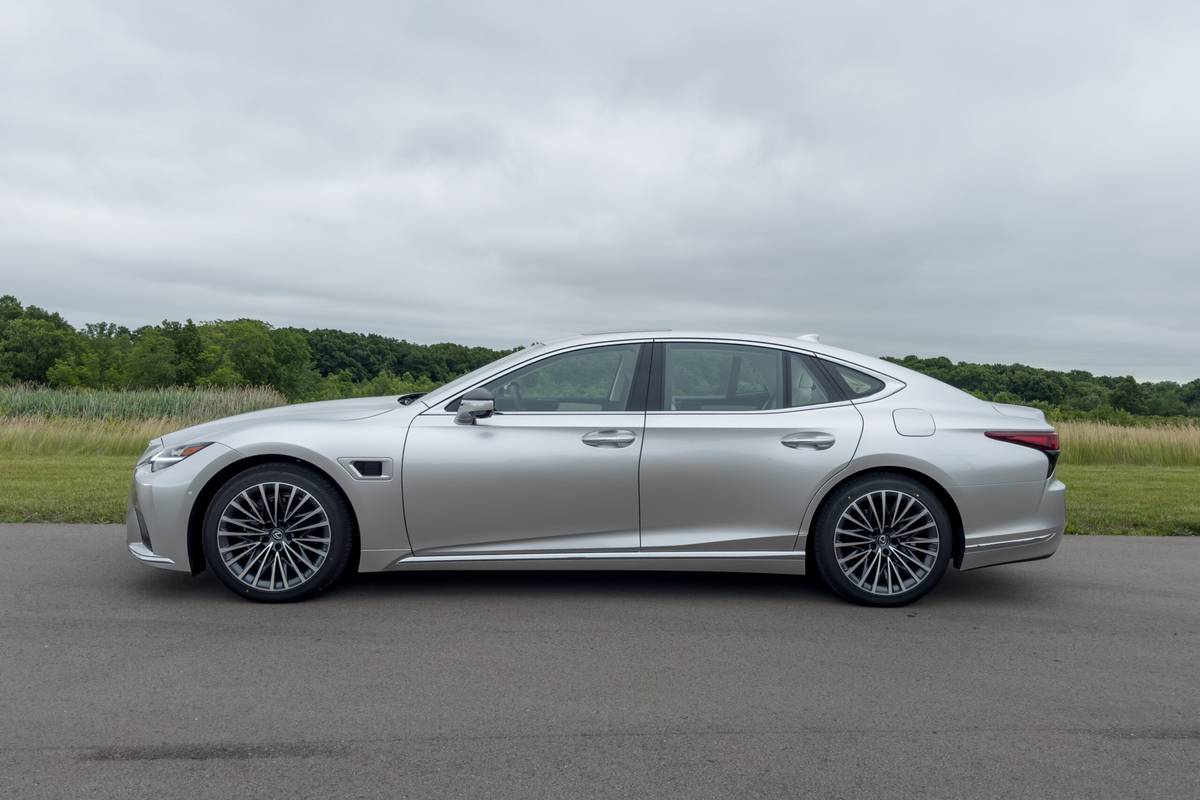
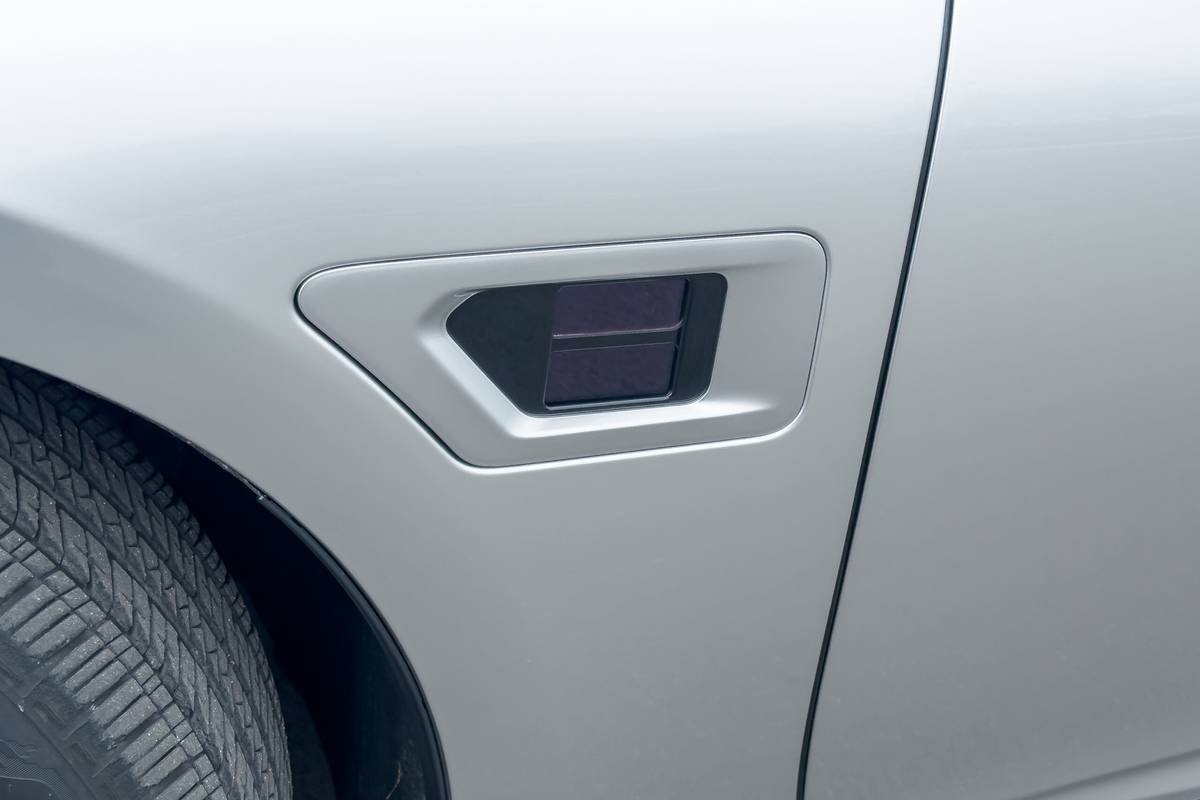
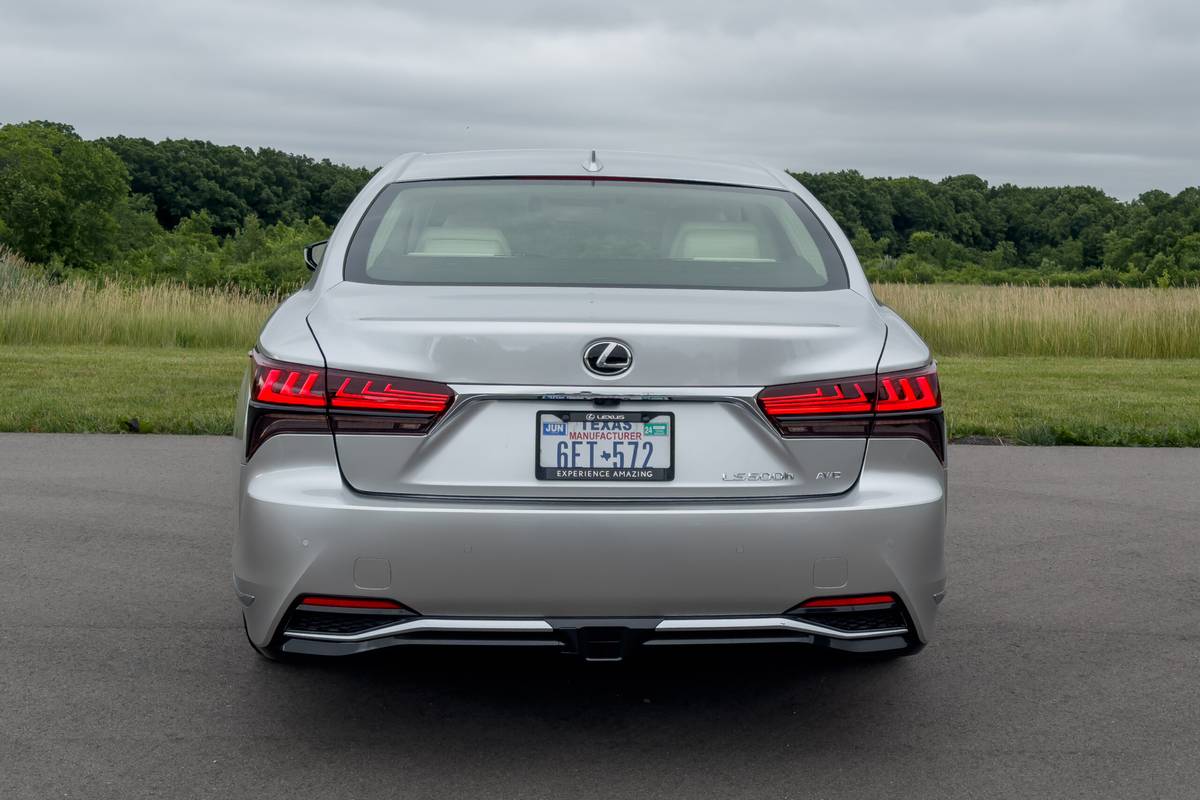
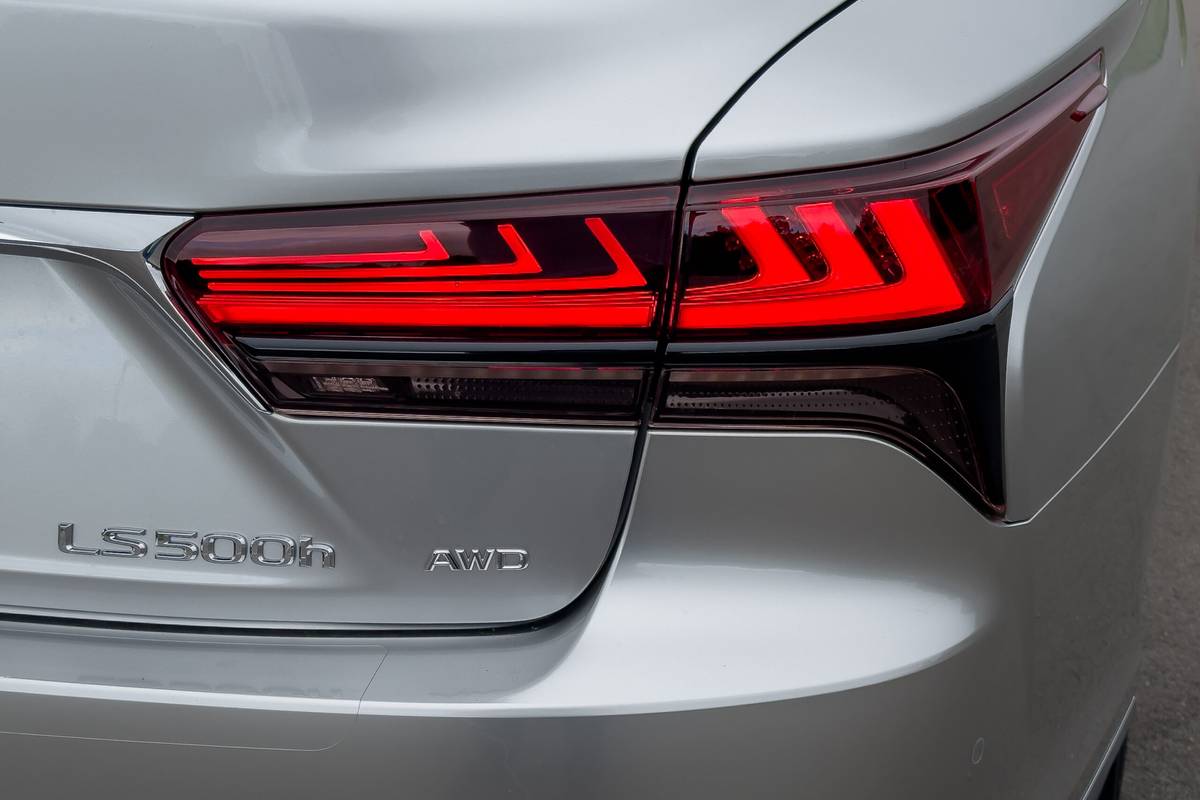
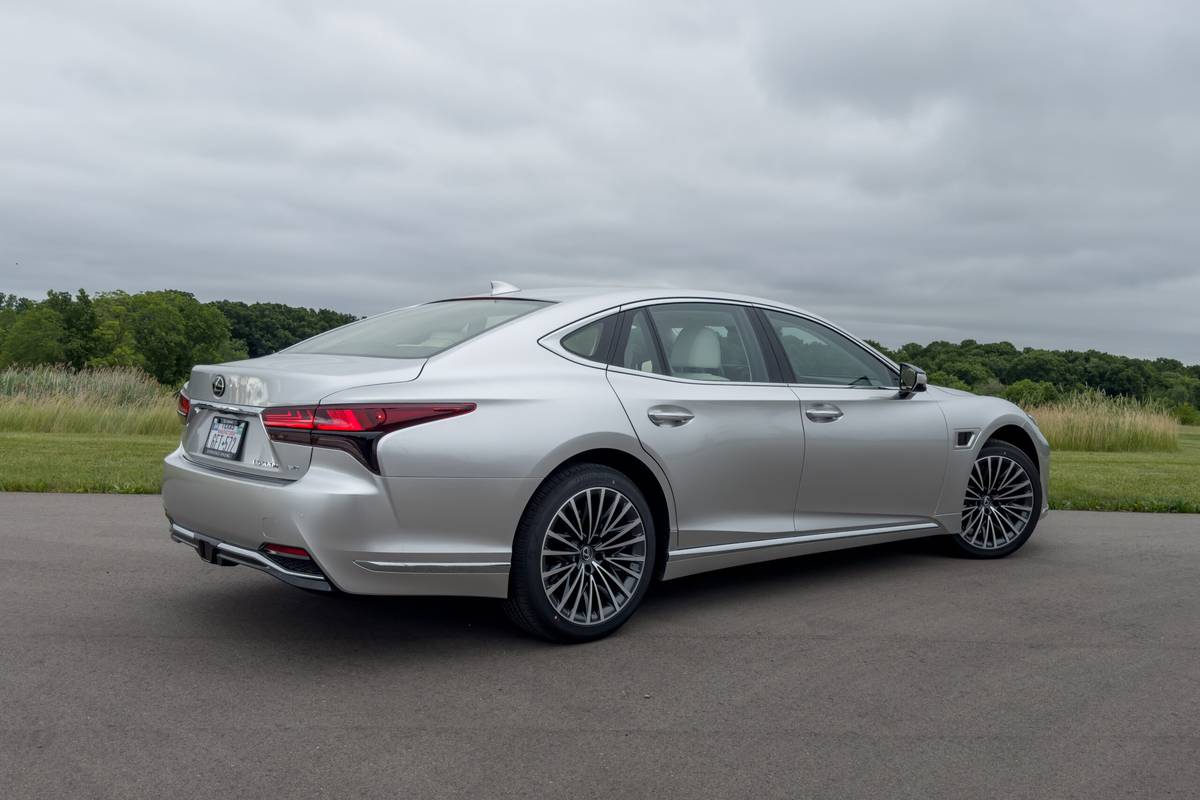
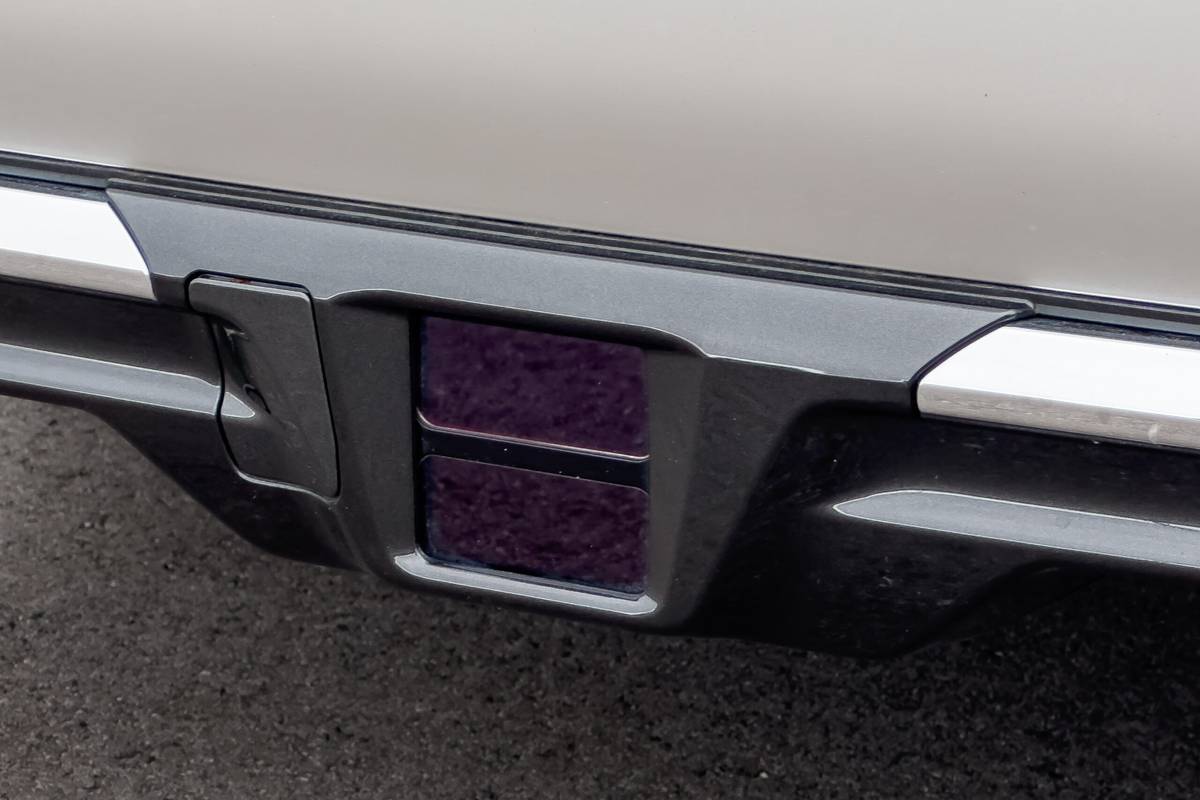









We’ve Seen This Look Before
To be blunt, the LS 500h looks too much like last year’s Toyota Camry. Its styling was updated in its 2018 redesign, making it more swoopy. Its then-new lower roofline and big spindle grille were de rigueur for Lexus models last decade, but they’ve been toned down on the brand’s latest offerings (see the 2024 RX and TX SUVs).
Even so, Lexus’ whole sedan lineup feels like a derivative of the Toyota lineup (or maybe it’s vice versa), which makes sense given Lexus is Toyota’s luxury brand. The two lineups feature similar squinty headlights, big “fish-mouth” grilles and slim taillights. It’s an almost biological look, with more flowing, organic shapes than you see on, say, a Genesis G90, which features more formal, upright and angular surfaces. It’s not unattractive, but it is overly familiar and well used. With Toyota sedans now going for a new look, we’re looking forward to what the next Lexus sedan family look will be — and hoping it’s quite different from what we have now.
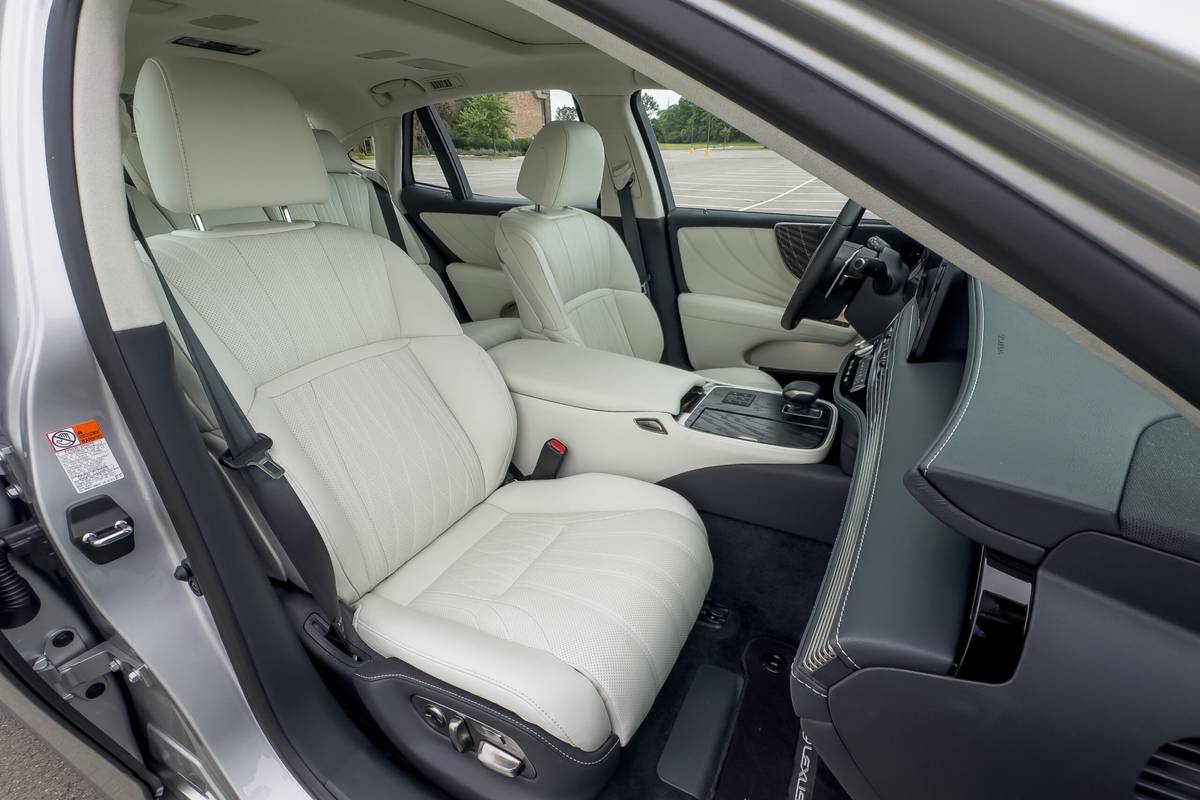

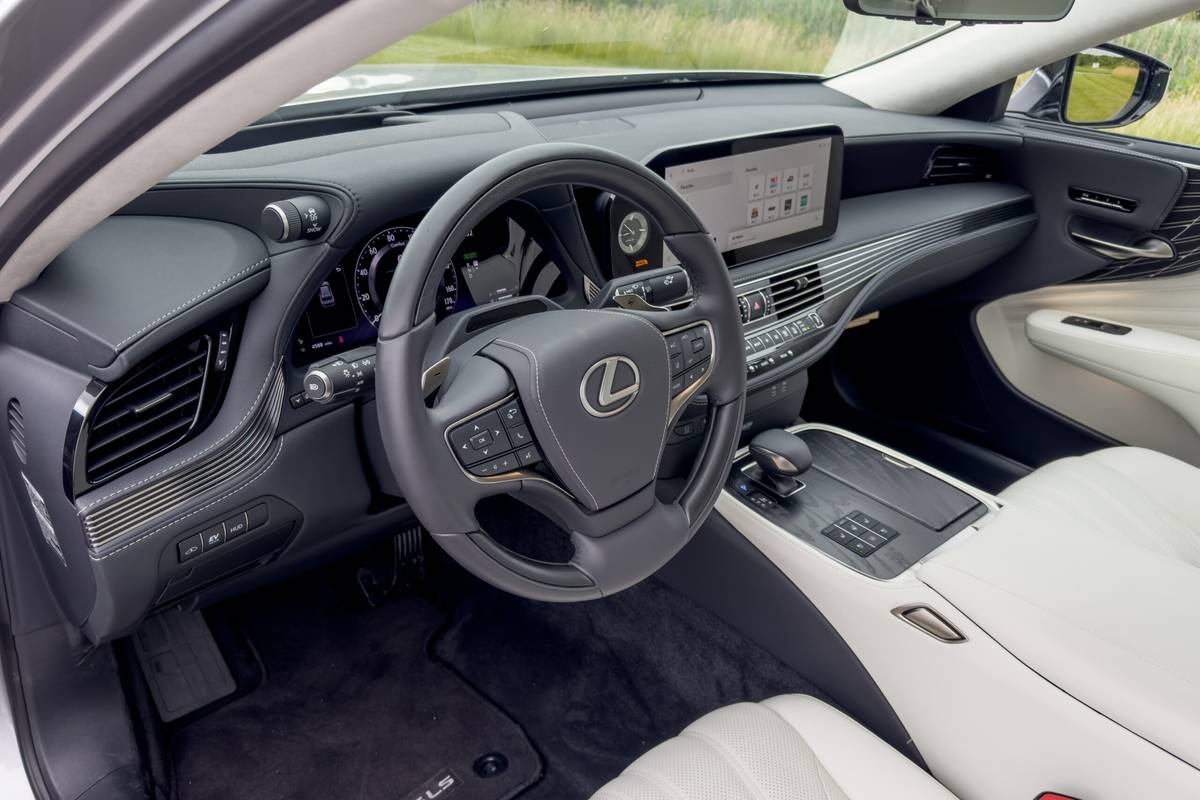

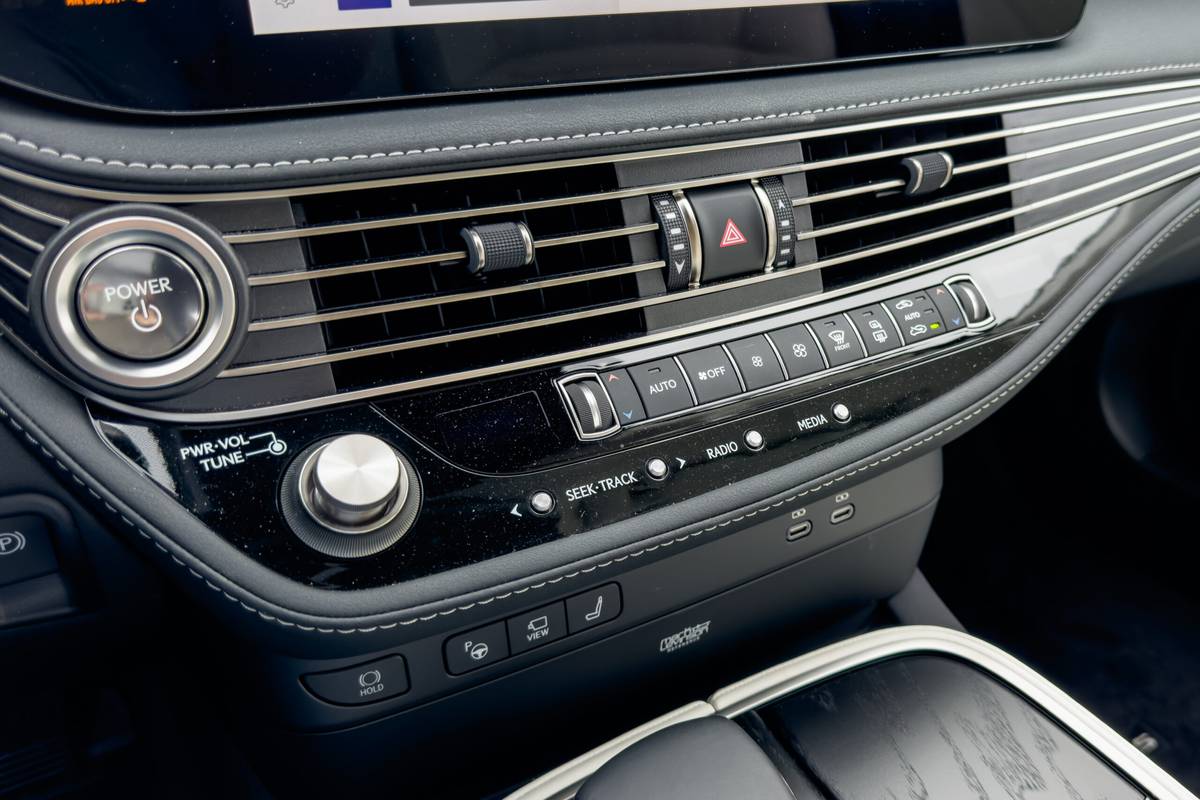
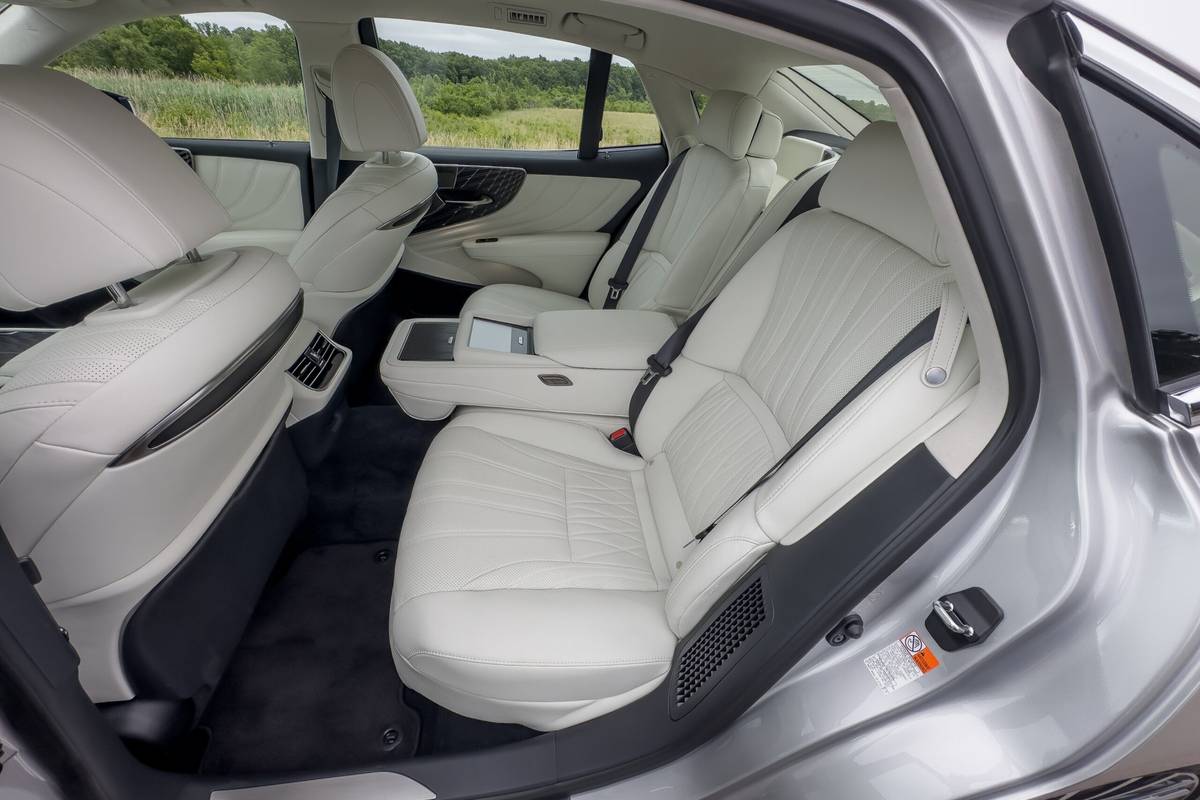
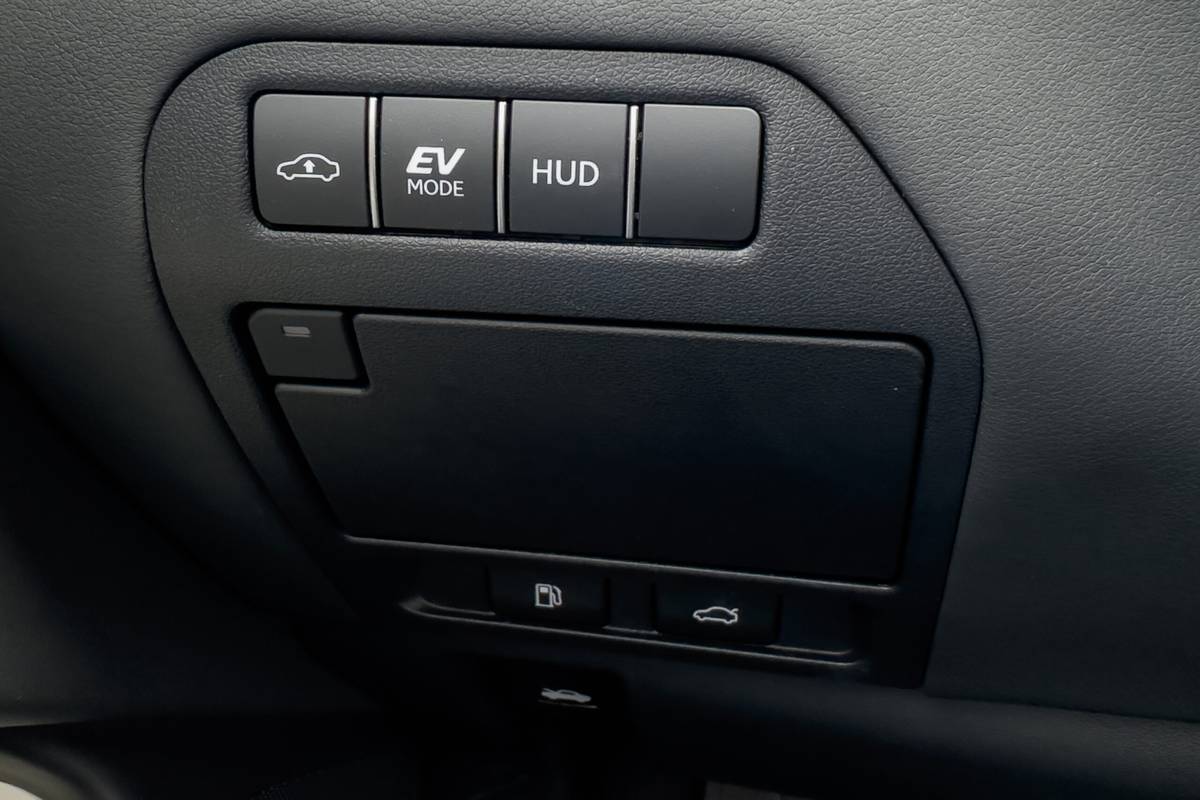
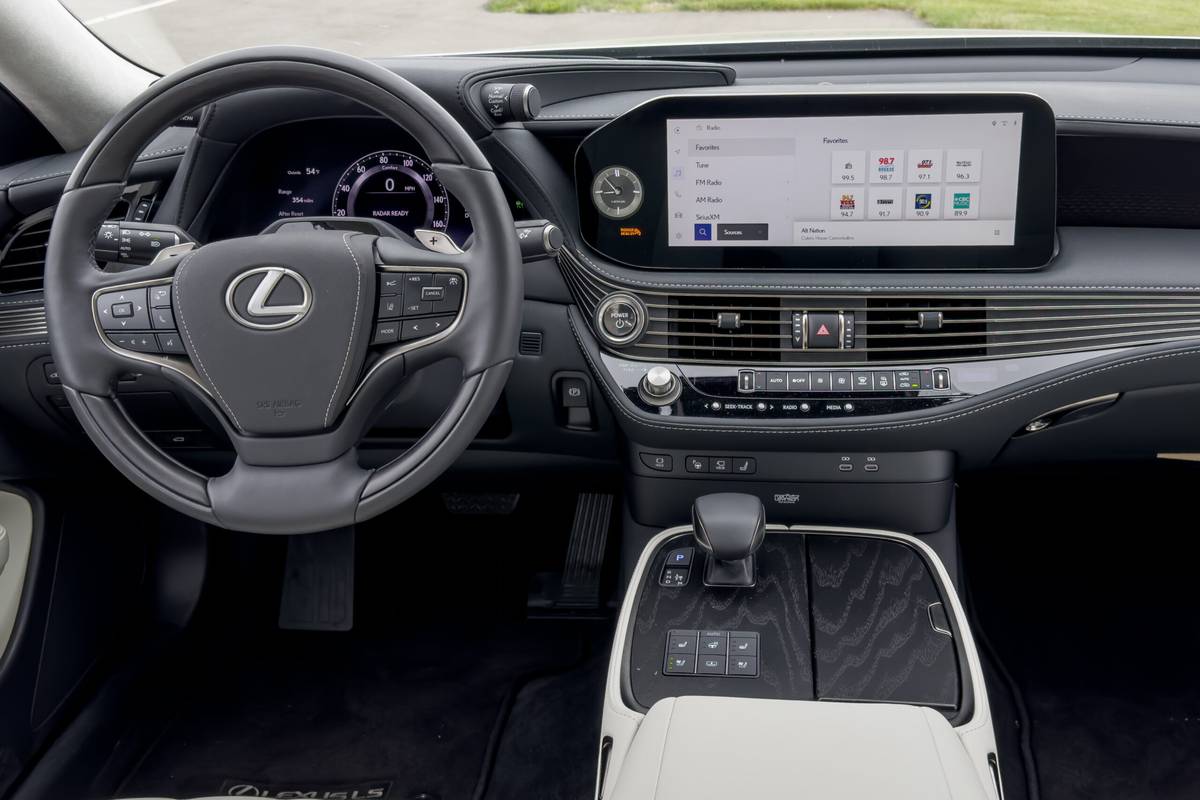








A Classy, Simple Interior
If all the latest touch controls in German luxury cars have your head spinning, longing for the days when you could accomplish a simple task using a simple, easy-to-use button, then the LS 500h is absolutely your luxury sedan. An update for 2021 saw the interior get a new touchscreen-based multimedia system, but Lexus didn’t move all the LS’ ancillary controls — things like climate, audio and seat controls — into that screen. There are still rows and banks of buttons (but not too many), all of which are easily identifiable and usable (except, perhaps, the ones Lexus and Toyota have for decades placed by your left knee). Get out of a new 7 Series or S-Class and into an LS, and you’ll immediately breathe a sigh of relief. Everything inside is intuitive and easy to operate; you won’t need a week’s worth of training to figure out how to operate the air vents or select a radio station. Some may say the LS feels old-fashioned by comparison, but perhaps it would be better described as “good-fashioned.”
The shapes and artistry of the interior are quite nice, even if the materials don’t feel much more premium than those in most vehicles these days. Lexus vehicles lost their “specialness” in this area a long time ago; really only the LC 500 coupe and convertible offer up cabins that can truly be called impressive. The LS isn’t too shabby, but my 500h’s interior could have been snazzier. The dour black upholstery made the whole cabin a somber affair, but brighter tan or white leather upholstery is available, and even a bright red interior can be had if you go for the F Sport model instead of the hybrid. Comfort is excellent, with supportive seats front and rear, along with excellent legroom. Headroom is a bit tight, however, and the cabin does feel a bit tighter overall than competitors’ — especially the limousine-like G90.
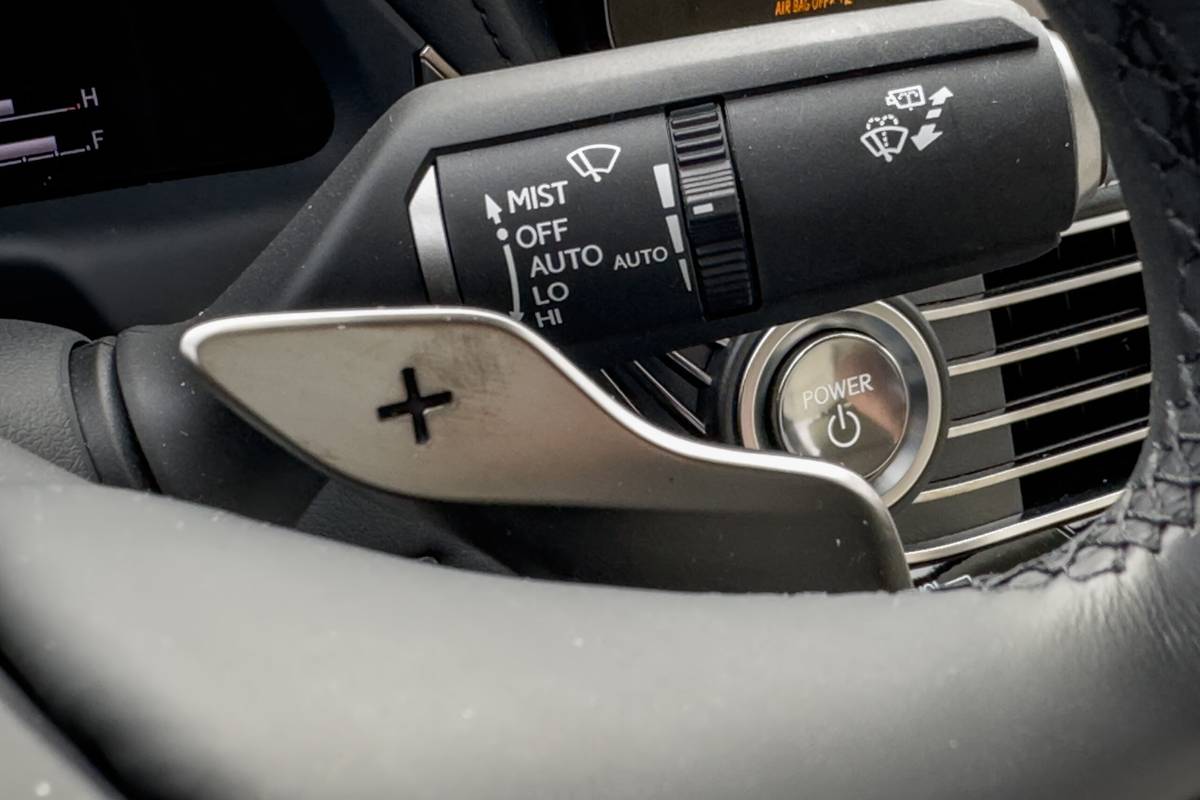
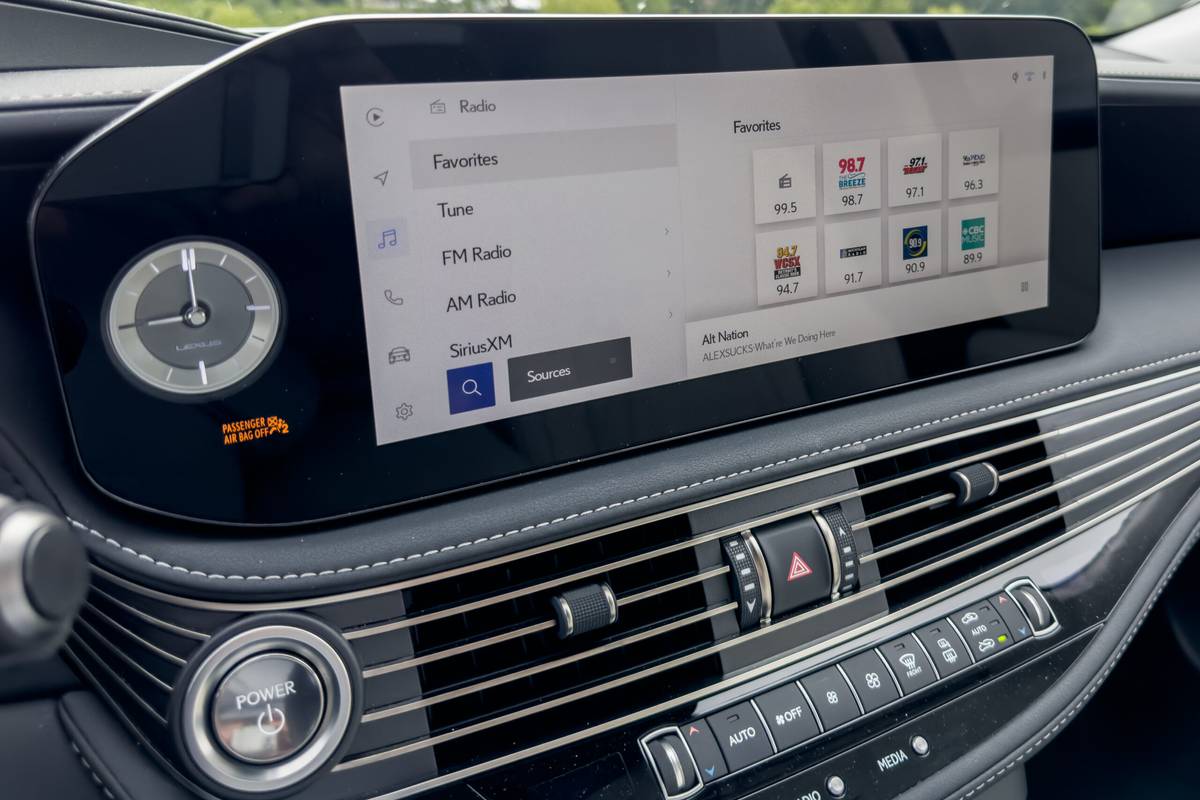
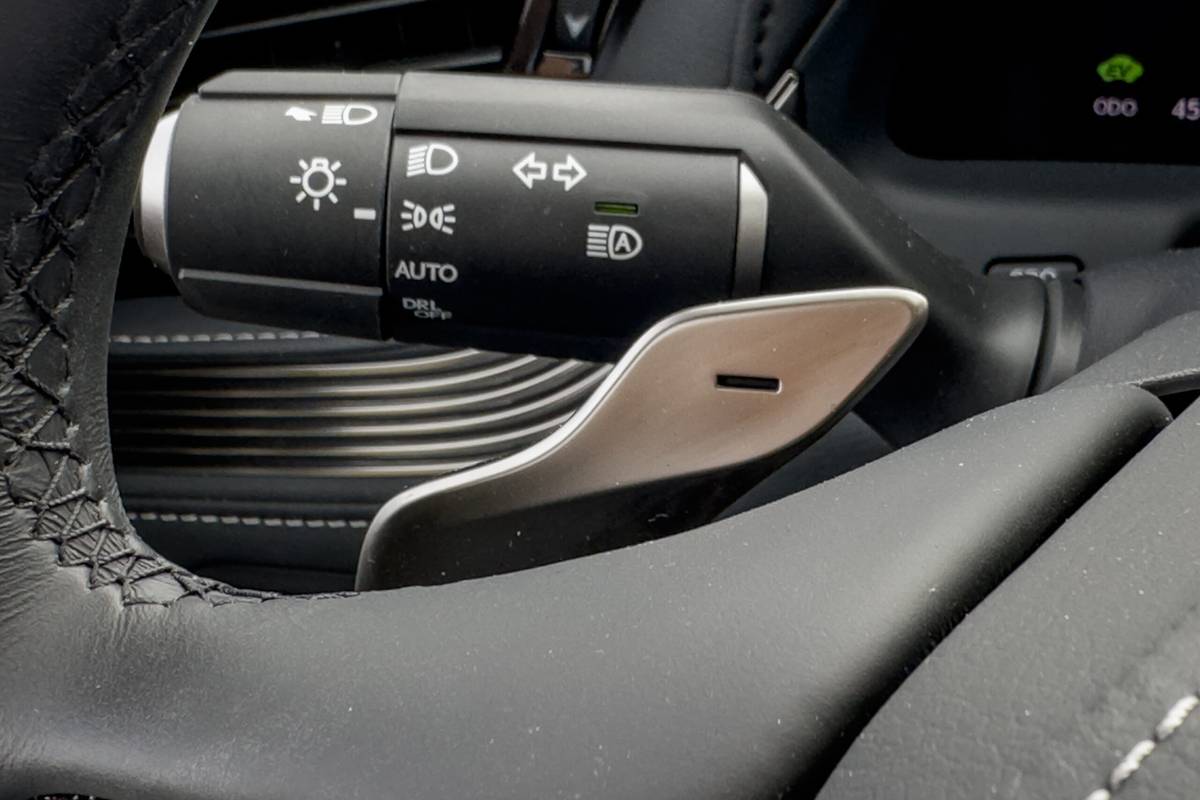
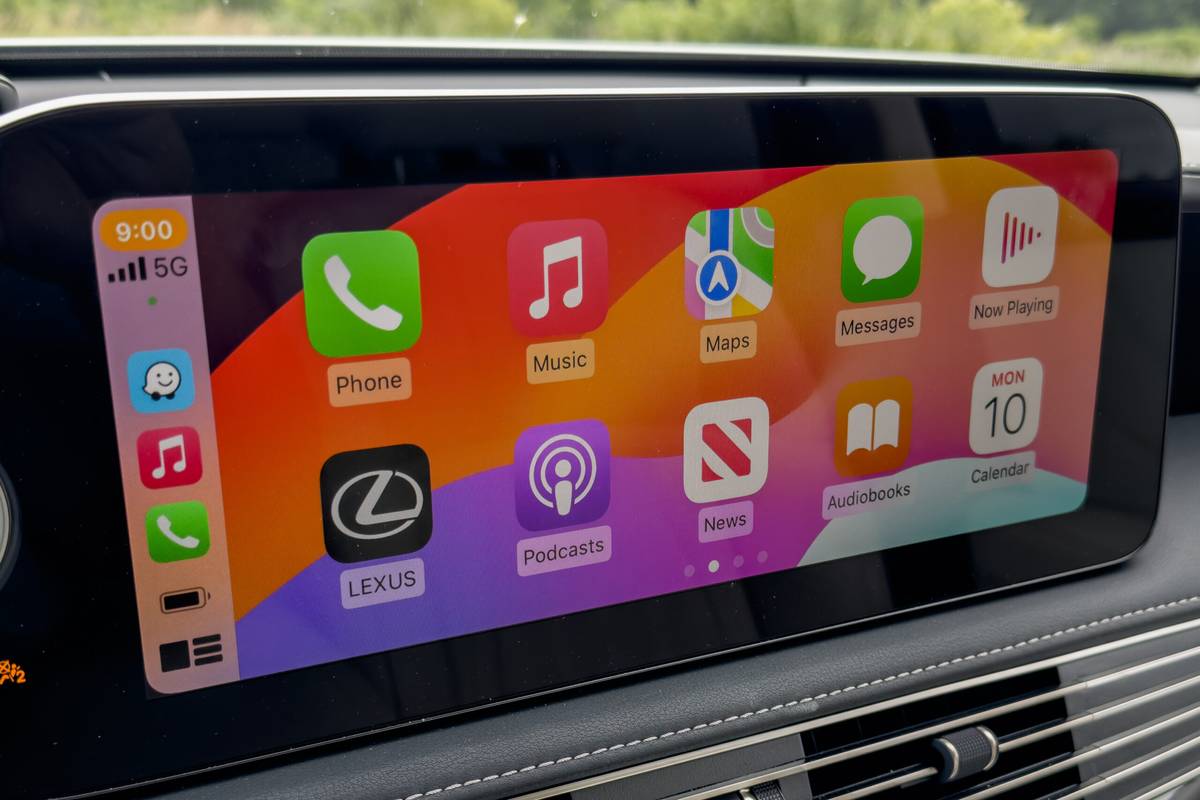
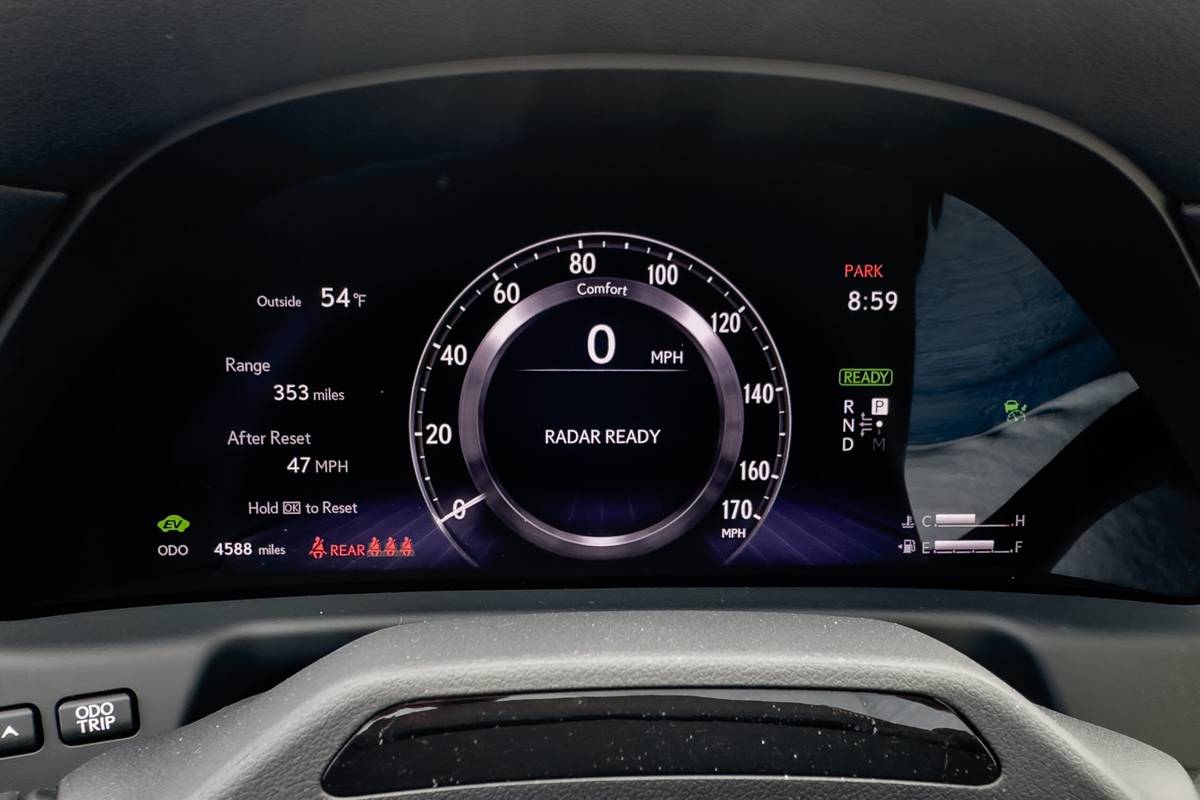
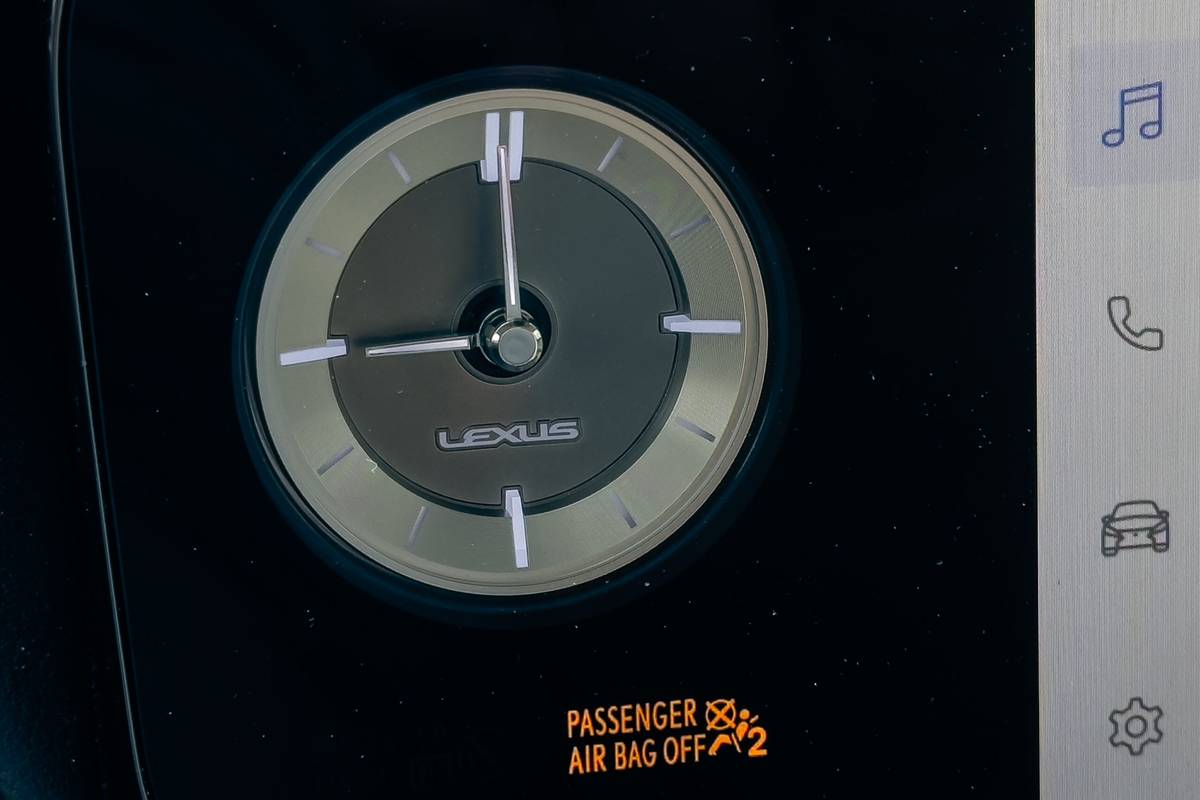
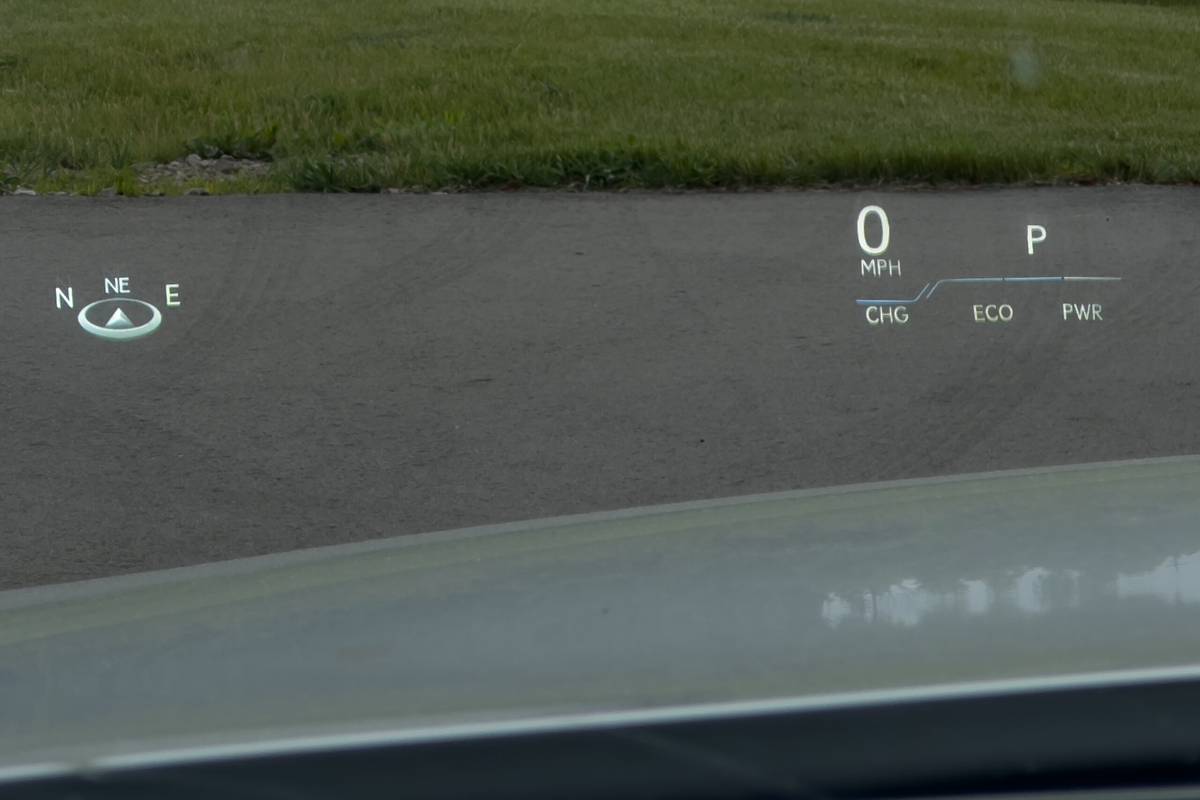
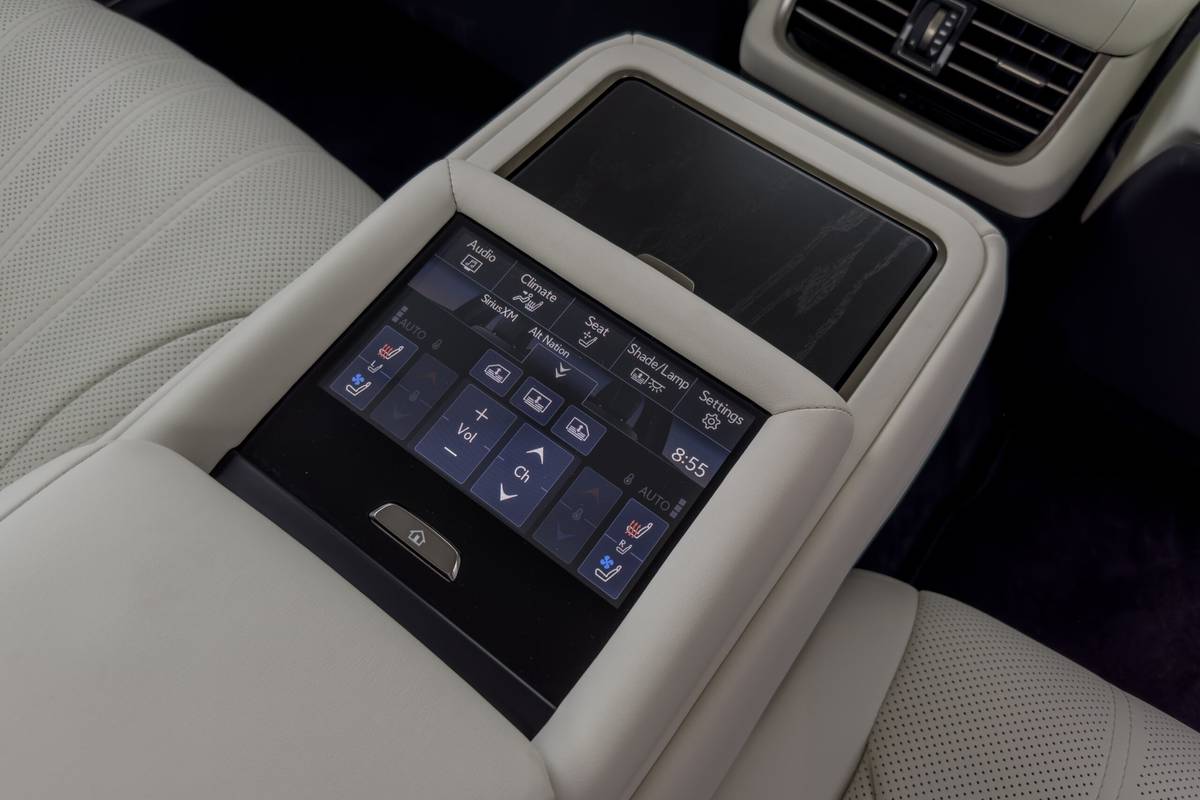
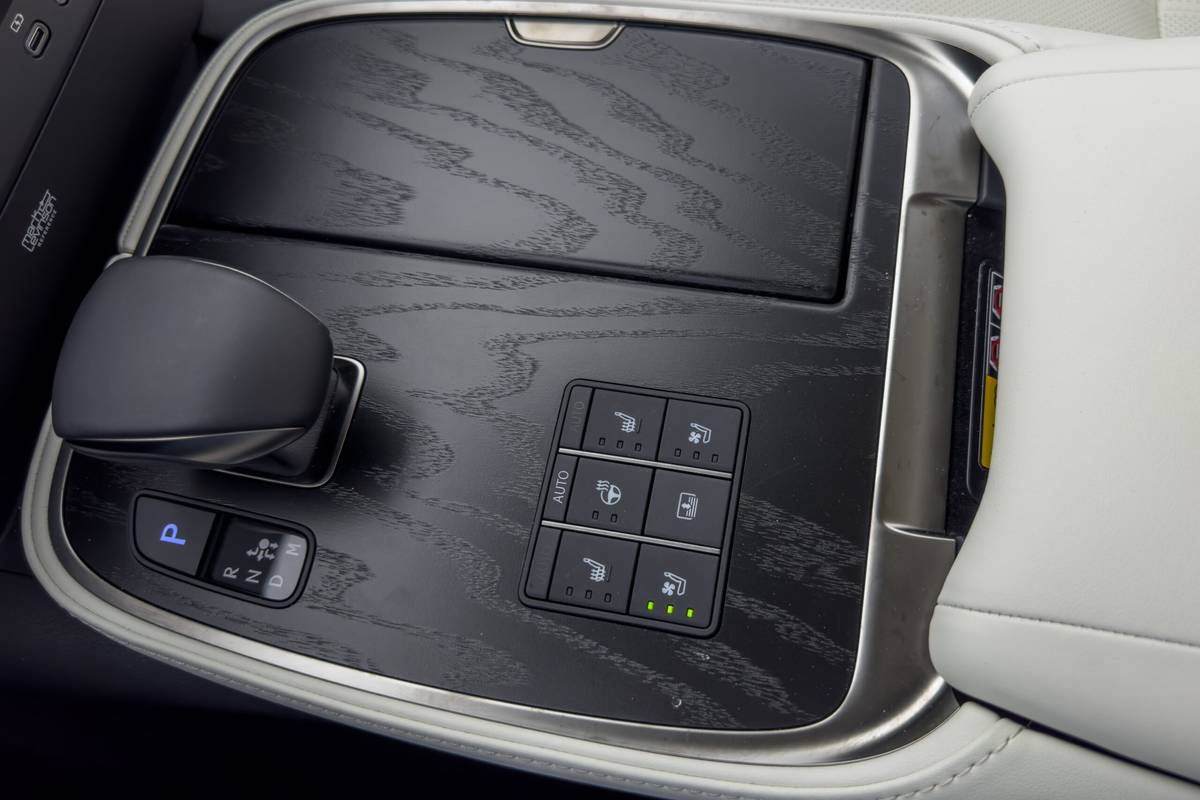









The Experience
While the interior may be a bit behind the times, the powertrain doesn’t feel old. The LS 500h has a gas-electric hybrid system that uses a 3.5-liter V-6 engine, good for a total of 354 horsepower, while the gas-only LS 500 uses a 416-hp, twin-turbo 3.4-liter V-6. The LS 500h hybrid has standard all-wheel drive and what Lexus calls a “multi-stage hybrid” transmission. It’s not a plug-in hybrid, so there’s no all-electric range or port to charge it, but the LS 500h allows for limited low-speed electric operation in certain environments, like parking lots. The hybrid system can also shut the engine down at cruising speeds for added efficiency — and efficiency is the name of the game with this model, along with smooth, quiet operation. With an EPA rating of 22/29/25 mpg city/highway/combined, fuel economy is decent for such a large vehicle. My week with the LS 500h, which included highway use between Detroit and Chicago, saw it net an impressive 30 mpg overall.
As you’d expect from a Lexus flagship, acceleration is quiet and creamy-smooth, coming on in a seamless rush that integrates the electric and gasoline systems quite well. Most other aspects of the LS are just as smooth, including braking operation, steering feel, ride quality and handling. It’s all appropriately muted and calm.
One foible occurs in lower-speed, around-town operation, where the transmission seems to hunt for the right combination of gas and electric integration, occasionally resulting in a confused surge that isn’t entirely what you called for. If you want a more athletic feel, there’s an F Sport option for the LS 500 but not for the LS 500h hybrid. This is a cruiser, not a bruiser, and it’s designed to provide a coddling, isolating experience, not a spirited one.
The LS works just fine for that: Comfort and serenity are its two main goals, followed by luxury and efficiency. It’s a fine flagship, even if its style and design might be a bit behind the latest and greatest. If you’re interested in a more traditional style of luxury isolationism, which Lexus made its bones delivering, the LS 500h is still a good choice.
Problem Tech
This isn’t to say Lexus hasn’t been trying out some new technology on the LS. This car does have Lexus Teammate, a hands-free driving system in the vein of GM’s Super Cruise and Ford’s BlueCruise. It debuted on the LS two years ago, and it’s standard on the 2024 LS 500h, but the system hasn’t shown up on any other offerings in Lexus showrooms just yet. Lexus Teammate is one of the most comprehensive systems on the market, with laser range finders, radar and a system of driver checks and status reports. It’s designed to allow users to let the vehicle operate hands-free on mapped roads at certain speeds, conditions permitting. I first experienced it three years ago at a Toyota event in Texas and came away with concerns about how well it worked, its intrusiveness and whether or not it actually delivered on its promise of creating a more relaxed driving experience.
As I stated then, “In a nutshell, Lexus Teammate is fussier, seemingly less trusting of the driver, and requires a significantly greater level of driver participation and monitoring in what is supposed to be a Level 2 semi-autonomous system.” That’s a direct comparison with competitors’ systems, including Super Cruise and BlueCruise. Simply put, GM’s Super Cruise remains the benchmark for these types of systems; it seemingly places far more trust in the car’s abilities than Lexus is willing to do.
Lexus describes its system as a driving aid, but it requires nearly the same amount of attention and involvement from a driver as it takes to drive a car yourself, right down to having to turn your head to check blind spots when using the semi-automated overtaking function. I tried using it again in the 2024 LS, and after several boneheaded maneuvers during a highway stint to Chicago — a few of which seriously rattled my passenger — I switched it off and didn’t bother with it again. In the three years since I drove a prototype of the system, it hasn’t been demonstrably improved over that initial software, whereas GM’s Super Cruise system continues to astound and amaze with its sophistication. The fact that this remains the only Toyotaverse vehicle to have hands-free cruise control might suggest just how well its development and rollout is going. (Which is to say, slowly.)
This really is the only tech problem in the LS. Its multimedia system works fine — it’s an uncomplicated system, perhaps not the most advanced one on the market, but that fits the theme of this car. It’s easy to use and learn, and its operation shouldn’t confuse older drivers .
More From Cars.com:
- 2025 Lexus LX Line Adds Hybrid 700h, Off-Road Overtrail Trim
- 2025 Lexus LC 500 Get More Bracing, Priced From $100,425
- 2025 Lexus RX Adds Standard Equipment, Black Line Special Edition
- Back to Black: 2025 Lexus ES Priced From $43,190, Black Line Special Edition Returns
- Shop for a 2024 Lexus LS 500h
The Bargain Flagship?
Pricing of the LS range is curious, as it starts considerably below all its direct competitors. A rear-wheel-drive LS 500 starts at $80,685 (all prices include destination fee), and pricing approaches $90,000 for an AWD F Sport model. That’s tens of thousands of dollars less than anything else in the full-size luxury sedan class: The Genesis G90 starts at $90,450, the Audi A8 starts a hair under $92,000, the base BMW 7 Series is $97,575, and the Mercedes-Benz S-Class tops them all with its $118,900 base price.
The price gap between the conventional LS 500 and the LS 500h hybrid, however, is considerable: The hybrid starts at $115,560 — or nearly $35,000 more than a base LS 500. There are very few options; my test car came in at $119,380 thanks to some special metallic paint. All told, that’s a 48% premium over the base LS — which you’ll never recover in gas savings, making non-hybrid versions of the LS the more appealing ones. If you’re looking for a luxurious, quiet, easy-to-use and comfortable full-size sedan — at what amounts to a bargain price versus other luxury brand offerings — the LS should definitely be on your list.
Related Video:
Cars.com’s Editorial department is your source for automotive news and reviews. In line with Cars.com’s long-standing ethics policy, editors and reviewers don’t accept gifts or free trips from automakers. The Editorial department is independent of Cars.com’s advertising, sales and sponsored content departments.

Detroit Bureau Chief Aaron Bragman has had over 25 years of experience in the auto industry as a journalist, analyst, purchasing agent and program manager. Bragman grew up around his father’s classic Triumph sports cars (which were all sold and gone when he turned 16, much to his frustration) and comes from a Detroit family where cars put food on tables as much as smiles on faces. Today, he’s a member of the Automotive Press Association and the Midwest Automotive Media Association. His pronouns are he/him, but his adjectives are fat/sassy.
Latest news
